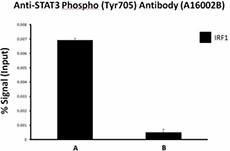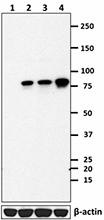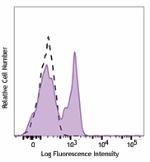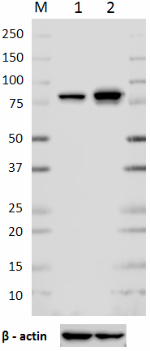- Clone
- A16002B (See other available formats)
- Regulatory Status
- RUO
- Other Names
- Signal transducer and activator of transcription 3, Acute-phase response factor, APRF, HIES
- Isotype
- Mouse IgG1, κ
- Ave. Rating
- Submit a Review
- Product Citations
- publications

-

Chromatin Immunoprecipitation (ChIP) was performed using commercial Protein-G coated 96 well high-throughput ChIP assay kit by loading 3 µg of cross-linked chromatin samples from HeLa cells starved overnight and then treated with IL-6 with either A) 1:50 dilution of Go-ChIP-Grade™ Purified anti-STAT3 Phospho (Tyr705) (Clone A16002B), or B) equal amount of Purified Mouse IgG1, κ Isotype Control Antibody. The enriched DNA was purified and quantified by real-time qPCR using primers targeting human IRF1 gene region. The amount of immunoprecipitated DNA in each sample is represented as signal relative to the 5% of total amount of input chromatin. -

Total cell lysate from PC3 cells (lane 1, 15 µg), HeLa cells (lane 2, 15 µg), untreated HepG2 (lane 3, 15 µg) and hIL-6 (10 ng/ml, 20 minutes) treated HepG2 (lane 4, 15 µg) were probed with purified anti-STAT3 Phospho (Tyr705) (clone A16002B) antibody and anti-mouse IgG antibody. Direct-Blot™ HRP anti-β-actin antibody (clone 2F1-1) was used as a loading control. -

Human whole blood was stimulated with (filled histogram), or without (open histogram), IL-6 for 15 minutes, treated with RBC Lysis/Fixation Solution (10X), permeabilized with True-Phos™ Perm Buffer, and then stained with purified STAT3 Phospho (Tyr705) (clone A16002B), followed by AlexaFluor® 647 goat anti-mouse IgG antibody. Data shown is gated on lymphocytes. -
HepG2 cells were starved overnight and either left untreated (lane 1) or treated with IL-6 (lane 2). Total cell lysates (15 µg protein) were resolved by electrophoresis (4-20% Tris-Glycine gel), transferred to nitrocellulose membrane, and probed with a 1:10000 (0.05 µg/mL) dilution of purified anti-STAT3 Phospho (Tyr705) antibody (clone A16002B). Proteins were visualized using chemiluminescence detection after incubation with a 1:3000 dilution of HRP conjugated goat anti-mouse-IgG secondary antibody for the anti-STAT3 Phospho (Tyr705) (upper panel) or a 1:5000 dilution of Direct-Blot™ HRP anti-β-Actin (clone 2F1-1, lower panel). Lane M: Molecular weight ladder
| Cat # | Size | Price | Quantity Check Availability | Save | ||
|---|---|---|---|---|---|---|
| 690405 | 25 µg | 67€ | ||||
| 690406 | 100 µg | 208€ | ||||
Tyrosine phosphorylation of STAT3 at Tyr705 occurs in response to LIF, IL-6, leptin, OSM, EGF, PDGF, and HGF. It plays a key role in cell growth and apoptosis through mediating expression of a variety of genes in response to the stimuli.
Product DetailsProduct Details
- Verified Reactivity
- Human, Mouse
- Antibody Type
- Monoclonal
- Host Species
- Mouse
- Immunogen
- Human STAT3 peptide phosphorylated at Y705. Complete Freund's adjuvant.
- Formulation
- Phosphate-buffered solution, pH 7.2, containing 0.05% sodium azide
- Preparation
- The Go-ChIP-Grade™ Purified antibody was purified by affinity chromatography.
- Concentration
- 0.5 mg/ml
- Storage & Handling
- The antibody solution should be stored undiluted between 2°C and 8°C.
- Application
-
ChIP - Quality tested
WB, ICFC - Verified - Recommended Usage
-
Each lot of this antibody is quality control tested by ChIP. For ChIP, the suggested use of this reagent is 1:50 dilution by volume. For Western blotting, the suggested use of this reagent is 0.05 - 0.5 µg per ml. For intracellular flow cytometry using our True-Phos™ Perm Buffer in Whole Blood Protocol, the suggested use of this reagent is ≤ 0.5 µg per million cells in 100 µl volume. It is recommended that the reagent be titrated for optimal performance for each application.
- Application Notes
-
Recognition of pan STAT3, weak cross-reactivity with mouse (C57BL/6) STAT3 Phospho.
The STAT3 Phospho (Tyr705) antibody recognizes the regulatory tyrosine phosphorylation of human STAT3 protein and has been shown to be useful for Western blotting.This clone recognizes both unphosphorylated and phosphorylated (Tyr705) STAT3 protein.
- RRID
-
AB_2716053 (BioLegend Cat. No. 690405)
AB_2716053 (BioLegend Cat. No. 690406)
Antigen Details
- Structure
- STAT3 is a 770 amino acid protein of 88 kD. It consists of a DNA binding domain, a SH2 domain, a regulatory tyrosine responsible for binding of SH2 domain, and a C-terminal transactivation domain.
- Distribution
-
Ubiquitous.
- Function
- STAT3 is tyrosine phosphorylated by receptor kinases in response to a variety of cytokines and growth factors. It forms homo- or heterodimer with STAT1 when tyrosine is phosphorylated, and then translocates to nucleus, acting as a transcription regulator. It is also essential for the differentiation of TH17 cells, which is involved in autoimmune diseases. The small GTPase Rac1 binds and regulates activity of STAT3.
- Interaction
- When activated, STAT3 dimerizes and translocates to the nucleus where it regulates gene expression.
- Cell Type
- Embryonic Stem Cells
- Biology Area
- Cell Biology, Neuroscience, Neuroscience Cell Markers, Signal Transduction, Stem Cells
- Molecular Family
- Nuclear Markers, Phospho-Proteins
- Antigen References
-
1. Akira S, et al. 1994. Cell. 77:63.
2. Zhang X, et al. 1995. Science 267:1990.
3. Sanchez-Margalet V, et al. 2001. Cell. Immunol. 211:30.
4. Simon A, et al. 2000. Science 290:144.
5. Hoey T, et al. 1999. Adv. Immunol. 71:145. - Gene ID
- 6774 View all products for this Gene ID
- UniProt
- View information about STAT3 Phospho Tyr705 on UniProt.org
Related Pages & Pathways
Pages
Related FAQs
Other Formats
View All STAT3 Phospho (Tyr705) Reagents Request Custom Conjugation| Description | Clone | Applications |
|---|---|---|
| Go-ChIP-Grade™ Purified anti-STAT3 Phospho (Tyr705) | A16002B | ChIP,WB,ICFC |
Compare Data Across All Formats
This data display is provided for general comparisons between formats.
Your actual data may vary due to variations in samples, target cells, instruments and their settings, staining conditions, and other factors.
If you need assistance with selecting the best format contact our expert technical support team.
-
Go-ChIP-Grade™ Purified anti-STAT3 Phospho (Tyr705)

Chromatin Immunoprecipitation (ChIP) was performed using co... 
Total cell lysate from PC3 cells (lane 1, 15 µg), HeLa cells... 
Human whole blood was stimulated with (filled histogram), or... HepG2 cells were starved overnight and either left untreated...

 Login / Register
Login / Register 














Follow Us